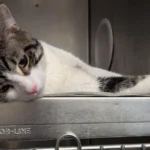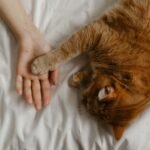Every cat owner has wondered about this mysterious question. When we leave for work, travel, or even just step out for groceries, do our feline companions actually notice? The answer might surprise you more than you think.
Cats can miss their owners and often show signs of attachment and separation anxiety when their humans are away. While cats are often labeled as independent creatures, cats can form deep emotional bonds with their human companions, and yes, they can absolutely miss them when they’re gone. Based on researchers’ conclusion that cats can indeed bond deeply with their owners, it makes sense that cats can also miss us when we are not around and respond positively to our return home.
The truth about feline attachment runs much deeper than their aloof reputation suggests. In 2019, Oregon State University researchers conducted a study on attachment bonds between cats and humans. They observed behaviors displayed by cats placed in a new room with their owner for 2 minutes and then left alone in the same room for 2 minutes without their owner before the owner re-entered the room. This proves that cats are certainly capable of forming secure and profound bonds with humans. Let’s explore the touching ways your cat reveals their longing when you’re apart.
Waiting by the Entrance Like a Devoted Guardian

Perhaps nothing speaks more clearly to feline devotion than finding your cat stationed by the door when you return. Some cats will sit by the door or run to it when they hear you coming home to show they’re happy you’re back. If you find your cat strategically placed by the door with an expectant gaze and alert ears, as if anticipating the sound of your keys or your footsteps; most surely, it has missed you and has been anticipating your return.
This behavior demonstrates something profound about the bond you share. Your cat has memorized the sounds of your approach and positions themselves in anticipation. It’s their way of saying they’ve been counting the moments until your return, transforming your simple homecoming into a reunion that matters deeply to them.
Becoming Your Shadow After Your Return

However, yours seems to be a little different; it has been shadowing you even since you got back from your holiday. Think no further, your darling feline missed you terribly. Following you from room to room or keeping you within sight becomes their new priority after separation.
This clingy behavior isn’t just coincidence. While your cat may not be that dedicated, you might notice them sticking closer than usual when you’re sad. They’re essentially making up for lost time, ensuring they don’t miss another moment of your presence. Think of it as their version of reassurance that you won’t disappear again.
Excessive Vocalization and Crying Out

Your cat may make more sounds, like meowing and trilling, to communicate with you and get your attention. While not renowned for their vocal nature, some cats become more expressive in their meowing when they yearn for their owner. An increased meowing is a sign that they missed you and crave your attention.
The sounds they make carry emotional weight beyond simple communication. These vocalizations often have a different quality when driven by longing. Some cats develop what sounds almost like conversation, as if they’re trying to tell you about their experience while you were away or expressing relief at your return.
Seeking Comfort in Your Scent

Cats love their scent, it is their way of marking territory, and purr-claiming, “You are mine!” Therefore, if you find your cat nestling among your recently worn clothes, that is a clear indicator that they are longing for you. Cats have an extraordinary sense of smell, and our scent provides a form of reassurance. Clothing, shoes, or bedding infused with your smell can help your cat feel safe in your absence. Some cats knead or nap on items carrying their owner’s scent, a behavior rooted in comfort and attachment.
This scent-seeking behavior reveals the depth of their emotional connection. Your smell becomes a source of comfort and security in your absence. It’s remarkably touching to discover your favorite sweater has become their temporary security blanket.
Displaying Changes in Eating Patterns

Your absence might have disrupted your cat’s eating routine and this can cause a change in their eating habits. Some cats eat less, while others may overindulge due to stress. Nevertheless, both behaviors are reflective of their longing for your consistent presence. Some cats may show a loss of appetite after their owner leaves home. This could be due to digestive issues caused by anxiety, or it could be a way for cats to express their missing to their owner.
Food represents routine and security to cats, so disruptions in eating habits often signal emotional distress. Some cats might barely touch their meals while others stress-eat, but both responses indicate that your absence has affected their sense of well-being in fundamental ways.
Increased Affection and Physical Contact

If your cat comes trotting over to you when you get home and displays behaviors like headbutting you, purring, and chirping or trilling contentedly, this is a sure sign that they’re ecstatic to see you. Rhythmic paw-kneading is a behavior reminiscent of kittenhood nursing, and it often surfaces when your cat is feeling content and secure. A combination of that with symphonic purring is the sign you have been waiting for: your kitten missed your companionship and is overjoyed that you are back.
The intensity of their affection upon reunion often exceeds their normal behavior. Head bumps become more frequent, purring reaches new volumes, and they might even drool slightly from pure contentment. These are clear indicators that your presence was deeply missed and is now deeply cherished.
Exhibiting Restless or Destructive Behavior

When cats are lonely, they may knock things over, scratch furniture, or chew on non-food items. Some cats may exhibit restlessness after their owner leaves, such as continually damaging furniture and yelping. The physiological mechanism behind this behavior may be that cats try to draw the owner’s attention through sound and behavior.
This destructive behavior isn’t random mischief. It’s often a desperate attempt to cope with anxiety or to somehow bring you back through familiar activities. The damage they cause can actually be seen as a cry for help, expressing emotions they cannot otherwise communicate.
Showing Signs of Depression and Lethargy

If your cat is sleeping a lot or eating less while you’re gone, they might be depressed or have separation anxiety. Cats may become less active after their owners leave home, showing more laziness and listlessness. This behavior may be caused by the cats feeling lonely and bored without their owner’s company.
The emotional weight of missing you can manifest as genuine depression in sensitive cats. They might spend hours in spots where you usually sit, moving less and showing little interest in activities that normally excite them. This withdrawal is their way of conserving emotional energy while coping with your absence.
Demonstrating Aggressive Behavior Toward Others

Your cat could act aggressively toward their pet sitter by growling, swiping, or biting. Van de Kieft says this could be a sign they’re upset because you’re not there. This aggression isn’t necessarily directed at the caregiver as a person, but rather represents frustration and confusion about the disruption to their routine and your absence.
Think of it as their way of expressing that no substitute can fill the emotional void you’ve left behind. The aggression might also stem from protective instincts, as if they’re guarding your space until your return. It’s actually a backhanded compliment to the strength of your bond.
Excessive Grooming as a Coping Mechanism

Cats, when experiencing stress or anxiety due to your absence, may resort to excessive grooming as a coping mechanism. If you’re concerned about how they’re coping with time on their own (for example, they’re showing signs of stress such as overgrooming, vomiting, or urinating out of the litter tray when you’re not there) contact your vet to ensure there are no medical issues affecting them.
Over-grooming serves as both self-soothing and a displacement behavior when cats feel overwhelmed by emotion. You might notice bald patches or irritated skin where they’ve focused their anxious energy. This behavior shows how deeply your absence affects their emotional state, driving them to seek comfort through familiar self-care routines.
Conclusion

Ultimately, cats do miss their owners, though they express it differently than dogs. Cats may be independent, but they are also emotionally intelligent creatures capable of love and attachment. If you’ve ever wondered whether your feline friend misses you when you’re gone, chances are they do – in their own quiet but meaningful way. Building a strong relationship with your cat ensures that they not only enjoy your presence but truly feel your absence when you’re away.
These ten emotional behaviors reveal the profound depth of feline attachment that often goes unrecognized. Your cat’s way of missing you might be subtle, but it’s no less real or meaningful than more obvious displays of affection. The next time you return home to find evidence of these behaviors, remember that they represent the ultimate compliment from a creature that chooses to love you.
Understanding these signs helps us appreciate the emotional complexity of our feline companions and reminds us that behind those independent exteriors beat hearts that genuinely ache in our absence. What signs have you noticed in your own cat? The evidence might be more touching than you ever realized.






